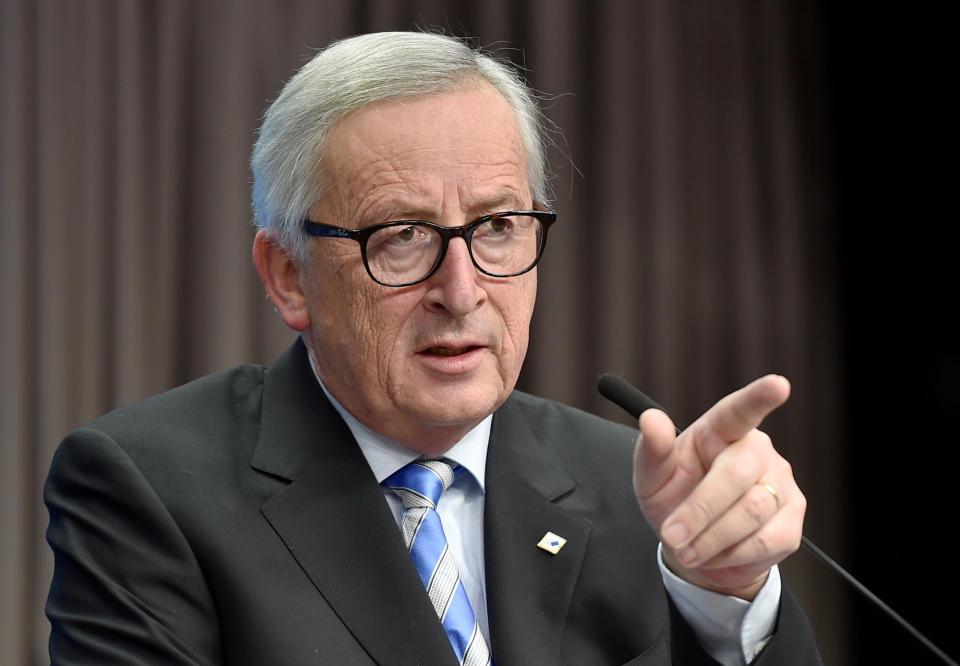EU leaders give 'solemn' backstop reassurances to May ahead of Brexit vote

EU leaders have sent a letter of reassurance over the Irish border backstop to prime minister Theresa May in a last ditch bid to help her win the vote over the Brexit deal.
“Just like the United Kingdom, the European Union does not wish to see the backstop enter into force,” says the letter from European commission president Jean-Claude Juncker and EU council president Donald Tusk.
It came in response to a call on the pair from May to give “further reassurances that the fears that some hold on both sides are misplaced.”
My reply to @theresa_may, together with @eucopresident, providing clarifications to the #Brexit Withdrawal Agreement and Political Declaration. pic.twitter.com/f0PalJkRVu
— Jean-Claude Juncker (@JunckerEU) January 14, 2019
The letter stresses the “legal value” of the conclusions of last month’s EU summit, which say that the backstop will “only apply temporarily” if ever implemented. They also commit the EU to working quickly on a free trade deal in order to avoid the backstop being needed.
The conclusions “may commit the European Union in the most solemn manner,” states the letter.
The letter also goes further than before in committing the EU to proposals for avoiding the backstop which have been put forward by Brexit supporters.
It says technological solutions to the Irish border situation, which were once derided as “magical thinking”, will be considered.
However, Juncker and Tusk make clear that the backstop must remain in the deal, telling May: “We are not in a position to agree to anything that changes or is inconsistent with the withdrawal agreement.”
READ MORE: Brexit explained: what does the Irish backstop mean?
The EU turned down a request from Downing Street to state in the letter than the backstop would only last for one year, according to Irish public broadcaster RTÉ.
Despite that, May says she is “confident we will never have to use the backstop” following the clarifications offered by the EU.
“After two years of detailed, and often tough, negotiations, I strongly believe the fear about the EU’s intentions is unfounded,” she adds in her own letter to Juncker and Tusk.
Irish foreign minister Simon Coveney said the EU has delivered a “clarity, support and a positive commitment to work with the UK.”
But the long anticipated exchange of letters seems to have done little to change the minds of opponents of the deal on either side of the Commons.
Shadow Brexit secretary Keir Starmer said the letters are simply a “reiteration of the EU’s existing position.”
The Prime Minister has once again failed to deliver.
This is a long way from the significant and legally effective commitment the Prime Minister promised last month. It is a reiteration of the EU’s existing position. Nothing has changed. https://t.co/LC7213Fv05
— Keir Starmer (@Keir_Starmer) January 14, 2019
Conservative rebel Guto Bebb said: “It is very clear that this exchange of letters alters absolutely nothing of substance in the Withdrawal Agreement. This is purely a cosmetic exercise.”
The backstop is a fall-back plan to ensure the border between the Republic of Ireland and Northern Ireland remains as smooth and low-key as possible, whatever the terms of Britain’s exit from the EU.
Northern Ireland is the only part of the UK that has a land border with another EU country, the Republic of Ireland, given the rest of Britain is an island.
There is a widely shared commitment among politicians of all stripes to keeping the Irish border as open as possible. Many fear that barriers between the north and south could revive the tensions behind the Troubles – the 30-year conflict over Northern Ireland’s status as part of the UK.
Meanwhile, one of the world’s most reputable think tanks — the Economist Intelligence Unit — believes that Brexit will not happen on 29 March, 2019, and that a ‘no-deal Brexit’ is the least likely scenario right now.
It predicts that UK prime minister Theresa May’s government will lose Tuesday’s ‘meaningful vote’ on the withdrawal agreement and political declaration negotiated in November and therefore be forced to ask for an extension on Article 50.
The EIU said that there is a 40% probability that May’s deal will eventually go through, if Britain has delayed Brexit after 29 March this year. Danielle Haralambous says she expects “May to resume her campaign to get a version of the deal approved by parliament in a subsequent vote by pursuing further assurances from the EU on the terms of withdrawal, and particularly on the terms of the Irish backstop arrangement.”
READ MORE: It’s more likely Brexit will not happen on 29 March, than no-deal — EIU

 Yahoo Finance
Yahoo Finance 